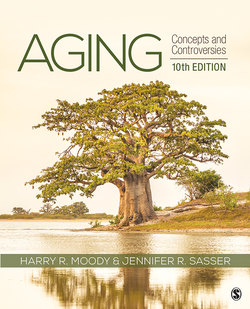Читать книгу Aging - Harry R. Moody - Страница 38
На сайте Литреса книга снята с продажи.
Cognitive Functioning
ОглавлениеThe search for interpretive meaning in later life underscores the importance of cognitive functioning in old age. Contrary to the popular stereotype, we don’t “lose a million neurons every day” as we grow older. Most people ages 65 and older do not suffer from memory defects or dementia. Among all those ages 65 and older, there are a moderate number—perhaps one in five—who have mild or moderate cognitive impairment. That means the overwhelming majority of older people have very little or no cognitive impairment. Memory deficits are actually quite limited among the large majority of older people. Nevertheless, some thinking processes do decline or change with age. Cognitive skills such as remembering, solving complex problems, paying attention, and processing language are affected by age- and disease-related changes in the brain.
Cognitive functioning is a critical issue because it is the aspect of psychological functioning most affected by aging. In addition, cognition has a greater effect than the other types of psychological functioning on the ability to perform the activities of daily living (ADLs) (Klimczuk, 2016). Those who experience memory impairment may not be able to keep up with needed medications or remember to turn off the stove when they’ve finished cooking. People who lose their judgment or become more impulsive may make extremely foolish decisions about how to spend their money or whom to trust. What’s worse, they may lose the ability to recognize their own mental shortcomings.
The picture for most older people, however, is considerably more positive. Although memory, reaction time, and basic information-processing and problem-solving abilities appear to decline with normal aging, other cognitive functions seem to remain stable or even improve. Wisdom and knowledge about the ways of the world, for example, are typical strengths of older people. In addition, training and practice in problem-solving skills, memory techniques, and other cognitive strategies can noticeably improve the abilities of older people.
It is important to remember the influence of life history and context as well. Older people who never learned a foreign language, for example, might have a more difficult time doing so in retirement than would an older person who had been bilingual from childhood. A person who worked as a carpenter in middle age might later be able to solve simple geometry problems faster than someone who worked as a nurse simply because the retired carpenter had been called on to solve geometry problems all his life.
Older people also remain adaptive and learn ways to cope with losses in cognitive functioning. For example, other people may help them compensate for cognitive losses through a social process dubbed “interactive minds” or “collaborative cognition” (Baltes & Staudinger, 1996). Imagine that a young relative has asked two older adult sisters about their parents. One may start out with the story of how their parents met but be stymied by the issue of who introduced them. The other sister may say, “Remember, it was their friend from the old neighborhood. What was his name? He always used to bring us butterscotch candies.” “Oh, I know who you mean,” says the first sister. “The man who played the accordion.” The other sister then remembers his name: “Yes, Mr. Catano. His family lived next door to Mother’s family, and he was in the band that Dad played in.” Similar teamwork helps older people function cognitively much better than they might on their own. That is one of the reasons that losing a spouse, another relative, a close friend, or some other central member of one’s social network can be such a problem for an older adult.
Another form of cognitive adaptation is “selective optimization with compensation” (Baltes & Baltes, 1990), which can be seen as one possible definition of “successful aging.” The idea of selective optimization is that older people gradually narrow the scope of the capabilities they seek to maintain to those that are most useful, just as we all do throughout life. For instance, a freshman college student may begin studying engineering, but by the time she begins to pursue a career, she may decide to specialize in the microchips that make appliances work and forget about becoming knowledgeable about hydraulics, engines, or other aspects of engineering.
The idea of compensation is that people seek new ways of accomplishing things that become difficult or impossible because of losses in functional capacity. An example of selective optimization with compensation is the case of pianist Arthur Rubinstein. As Rubinstein grew older, he reduced the music he played to those piano pieces he knew best and then practiced just those pieces more often (selective optimization). When it came time to play the faster passages, he would slow down his playing speed just beforehand to maintain the apparent difference between the slower and faster passages (compensation).
Although much research remains to be done on cognitive capacity in old age, particularly among the oldest-old, it is safe to say that the old stereotype of feebleminded seniors is not only counterproductive but also inadequate as a description of cognitive functioning in later life. Older people do seem to experience some cognitive challenges, but the losses through normal aging are gradual and for the most part can be accommodated. What is more, older people often have other cognitive gains to offer. Their experience of living gives them an understanding of the world and an ability to apply its lessons that younger people typically have not had time to develop.
